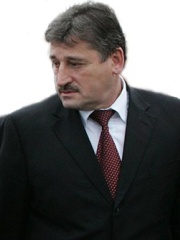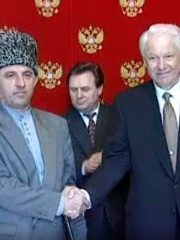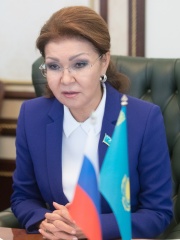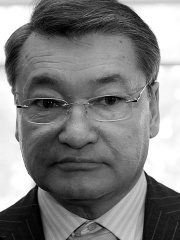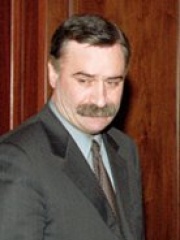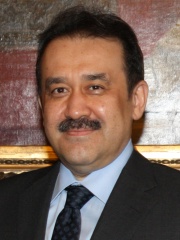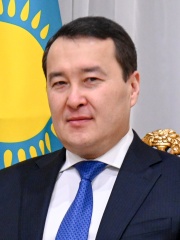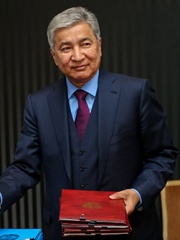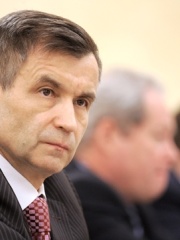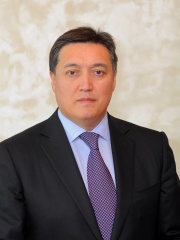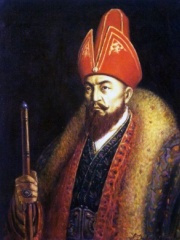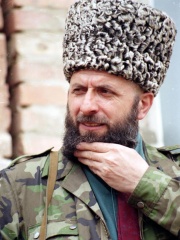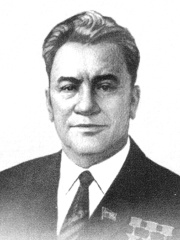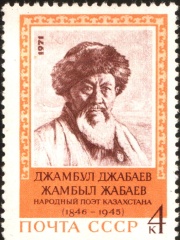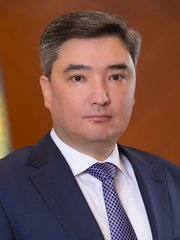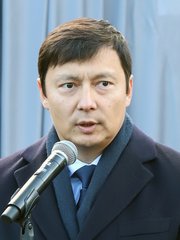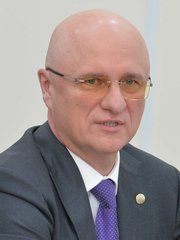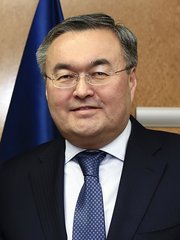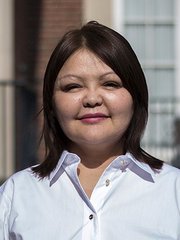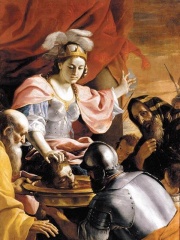
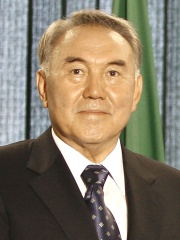
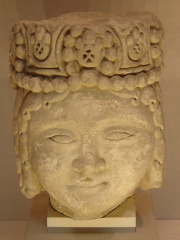
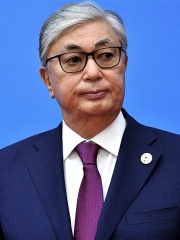
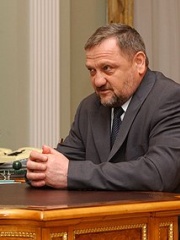
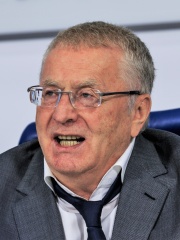
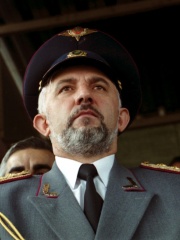
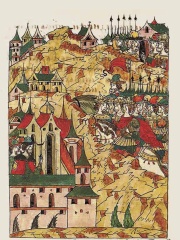
The Most Famous
POLITICIANS from Kazakhstan
This page contains a list of the greatest Kazakhstani Politicians. The pantheon dataset contains 19,576 Politicians, 49 of which were born in Kazakhstan. This makes Kazakhstan the birth place of the 69th most number of Politicians behind Chile, and Haiti.
Top 10
The following people are considered by Pantheon to be the top 10 most legendary Kazakhstani Politicians of all time. This list of famous Kazakhstani Politicians is sorted by HPI (Historical Popularity Index), a metric that aggregates information on a biography's online popularity. Visit the rankings page to view the entire list of Kazakhstani Politicians.

1. Tomyris (600 BC - 600 BC)
With an HPI of 81.59, Tomyris is the most famous Kazakhstani Politician. Her biography has been translated into 56 different languages on wikipedia.
Tomyris (; Saka: *Taumuriyah; Ancient Greek: Τόμυρις, romanized: Tómuris; Latin: Tomyris) also called Thomyris, Tomris, or Tomiride, was a queen of the Massagetae who ruled during the 6th century BCE. Tomyris is known only from the writings of the Greek historian Herodotus, according to whom she led her armies to defend against an attack by Cyrus the Great of the Achaemenid Empire, and defeated and killed him in 530 BC. She is not mentioned in the few other early sources covering the period, especially Ctesias. Tomyris became a popular subject in European art and literature during the Renaissance. In visual art, she was typically depicted either receiving the head of Cyrus or placing it into a vessel filled with blood, a motif derived from one version of the accounts. This theme belonged to the 'Power of Women' tradition in Renaissance art, which celebrated women who triumphed over men in various ways.

2. Nursultan Nazarbayev (b. 1940)
With an HPI of 77.27, Nursultan Nazarbayev is the 2nd most famous Kazakhstani Politician. His biography has been translated into 95 different languages.
Nursultan Abishuly Nazarbayev (born 6 July 1940) is a Kazakh politician who served as the first president of Kazakhstan from 1991 to 2019. He also held the special title of Elbasy from 2010 to 2022 and chairman of the Security Council from 1991 to 2022. Nazarbayev's political career began in the Soviet era, where he joined the Communist Party of the Soviet Union in 1962 while working as a steel factory worker. Rising through the party ranks, he became Prime Minister of the Kazakh SSR in 1984 and First Secretary of the Communist Party of Kazakhstan in 1989. In 1990, the Supreme Soviet elected him as the president of Kazakhstan. Nazarbayev played a key role in navigating Kazakhstan through the dissolution of the Soviet Union, leading to the country's independence in 1991. In the country’s first direct 1991 presidential election, Nazarbayev appeared on the ballot without opposition and secured an overwhelming victory. In 1995, ruling by decree, Nazarbayev extended his presidency through a referendum and adopted a new constitution that expanded his powers. He was re-elected in an undemocratic 1999 election, deemed eligible to run again in 2005 by a Supreme Court ruling, and benefited from a 2007 constitutional amendment solely exempting term limits for him, allowing undemocratic re-elections in 2011 and 2015. In March 2019, following a wave of protests and increasing discontent, Nazarbayev announced his resignation, handing over power to Kassym-Jomart Tokayev. Tokayev was elected president in a snap election in June 2019. While Nazarbayev stepped down from the presidency, he remained a powerful figure in Kazakh politics, retaining influence through his leadership of the Assembly of People of Kazakhstan and the Nur Otan party. He also chaired the Security Council until his dismissal in 2022. Nazarbayev's power was diminished following the 2022 unrest, which led to a constitutional referendum that stripped him of many privileges and titles, including his membership in the Senate and the Constitutional Council. By 2023, he had lost most of his official titles, signaling the end of his political dominance. Nazarbayev was one of the longest-ruling non-royal leaders in the world, having led Kazakhstan for nearly three decades, excluding chairmanship in the Security Council after the end of his presidency. He has often been referred to as a dictator due to his consolidation of power and autocratic rule. His tenure was marred by widespread authoritarianism, significant human rights abuses, nepotism, and systemic corruption. His leadership was further characterized by a pervasive cult of personality, with his image and influence deeply entrenched in the nation’s political and social landscape. Nazarbayev gained recognition for his efforts in nuclear disarmament, renouncing Kazakhstan’s inherited nuclear arsenal, and closing the Semipalatinsk Test Site.

3. Seljuk (902 - 1038)
With an HPI of 73.38, Seljuk is the 3rd most famous Kazakhstani Politician. His biography has been translated into 40 different languages.
Seljuk (died c. 1007 or 1009), variously romanized, was an Oghuz Turk warlord. He was the eponymous founder of the Seljuk dynasty and the namesake of Selçuk, the modern town near the ruins of ancient Ephesus in Turkey.

4. Kassym-Jomart Tokayev (b. 1953)
With an HPI of 72.91, Kassym-Jomart Tokayev is the 4th most famous Kazakhstani Politician. Her biography has been translated into 77 different languages.
Kassym-Jomart Kemeluly Tokayev (born 17 May 1953) is a Kazakh politician and diplomat who has served as the second president of Kazakhstan since 2019. He previously served as Prime Minister from 1999 to 2002 and as Chairman of the Senate from 2007 to 2011 and again from 2013 to 2019. Tokayev also held the position of Director-General of the United Nations Office at Geneva from 2011 to 2013. Born in Alma-Ata (now Almaty), Tokayev studied at the Moscow State Institute of International Relations and later trained at diplomatic institutions in China. He began his career in the Soviet Ministry of Foreign Affairs before joining Kazakhstan's foreign service after independence in 1991. Tokayev twice served as foreign minister, from 1994 to 1999 and 2002 to 2007, as well as state secretary from 2002 to 2003, playing a key role in shaping Kazakhstan's foreign policy and its nuclear disarmament policies. In March 2019, Tokayev became acting president following the resignation of Nursultan Nazarbayev. In June that year, he won the first round of a snap presidential election as the candidate of the ruling Nur Otan party. Initially aligned with Nazarbayev, Tokayev gradually consolidated power by removing key figures associated with the former president. His presidency has included various economic initiatives and a shift toward political reforms. In January 2022, large-scale protests over fuel prices escalated into violent unrest, prompting Tokayev to declare a state of emergency and request peacekeeping assistance from the CSTO. The subsequent crackdown resulted in casualties and mass arrests. Following the crisis, he distanced himself from Nazarbayev, removed key figures associated with the former leader, and implemented constitutional changes, including reducing presidential terms. In 2022, Tokayev was re-elected in a snap presidential election, winning 81% of the vote in first round. He ran as an independent candidate with the support of People's Coalition after leaving the Amanat (formerly Nur Otan) party, positioning himself as a reformist. His administration has focused on political restructuring, economic modernization, and maintaining a multi-vector foreign policy, balancing relations with Russia, China, and the West. Despite advocating political modernization, Tokayev's government has faced criticism for restricting opposition parties, limiting press freedoms, and suppressing protests. In 2022, leaked financial records revealed that his family held offshore assets since at least 1998.
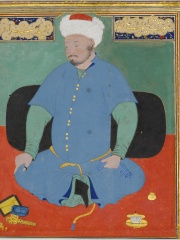
5. Muhammad Shaybani (1451 - 1510)
With an HPI of 72.01, Muhammad Shaybani is the 5th most famous Kazakhstani Politician. His biography has been translated into 34 different languages.
Muhammad Shaybani Khan (Chagatai and Persian: محمد شیبانی; c. 1451 – 2 December 1510) was an Uzbek leader who consolidated various Uzbek tribes and laid the foundations for their ascendance in Transoxiana and the establishment of the Khanate of Bukhara. He was a Shaybanid or descendant of Shiban (or Shayban). He was the son of Shah-Budag, thus a grandson of the Uzbek conqueror Abu'l-Khayr Khan.

6. Akhmad Kadyrov (1951 - 2004)
With an HPI of 71.59, Akhmad Kadyrov is the 6th most famous Kazakhstani Politician. His biography has been translated into 53 different languages.
Akhmat-Khadzhi Abdulkhamidovich Kadyrov (23 August 1951 – 9 May 2004) was a Russian politician and revolutionary who served as Chief Mufti of the Chechen Republic of Ichkeria in the 1990s during and after the First Chechen War. At the outbreak of the Second Chechen War he switched sides, offering his service to the Russian government, and later became the President of the Chechen Republic from 5 October 2003, having acted as head of administration since July 2000. On 9 May 2004, he was assassinated by Chechen Islamists in Grozny, by a bomb blast during a Victory Day memorial parade. His son, Ramzan Kadyrov, who led his father's militia, became his successor in March 2007 as the President of the Chechen Republic.

7. Vladimir Zhirinovsky (1946 - 2022)
With an HPI of 70.91, Vladimir Zhirinovsky is the 7th most famous Kazakhstani Politician. His biography has been translated into 63 different languages.
Vladimir Volfovich Zhirinovsky (Russian: Владимир Вольфович Жириновский, IPA: [vlɐˈdʲimʲɪr ˈvolʲfəvʲɪtɕ ʐɨrʲɪˈnofskʲɪj], né Eidelstein, Russian: Эйдельштейн; 25 April 1946 – 6 April 2022) was a Russian right-wing populist politician who served as the leader of the Liberal Democratic Party of Russia (LDPR) from its creation in 1992 until his death in 2022. Zhirinovsky served as a deputy chairman of the State Duma from 1993 to 2000 and from 2011 until 2022. He also worked as a delegate in the Parliamentary Assembly of the Council of Europe from 1996 to 2008. During his lifetime, Zhirinovsky ran in every single Russian presidential election except for the 2004 election. Zhirinovsky was known for many controversies, as well as staunch advocacy for Russian military action against NATO.

8. Aslan Maskhadov (1951 - 2005)
With an HPI of 70.62, Aslan Maskhadov is the 8th most famous Kazakhstani Politician. His biography has been translated into 60 different languages.
Aslan Aliyevich Maskhadov (Russian: Асла́н (Хали́д) Али́евич Масха́дов; Chechen: Масхадан Али-воӀ Аслан, romanized: Masxadan Ali-voj Aslan; 21 September 1951 – 8 March 2005) was a Soviet and Chechen politician and military commander who also served as the third president of the unrecognized Chechen Republic of Ichkeria. He was credited by many with the Chechen victory in the First Chechen War, which allowed for the establishment of the de facto independent Chechen Republic of Ichkeria. Maskhadov was elected President of Chechnya in January 1997. Following the start of the Second Chechen War in August 1999, he returned to leading the guerrilla resistance against the Russian army. De facto Ichkeria ceased to exist at the beginning of 2000. Until his death, Maskhadov was President in exile. He was killed in Tolstoy-Yurt, a village in northern Chechnya, in March 2005.

9. Edigu (1352 - 1419)
With an HPI of 67.25, Edigu is the 9th most famous Kazakhstani Politician. His biography has been translated into 29 different languages.
Edigu (also Edigü, Edigey, Eðivkäy or Edege Mangit; 1352–1419) was a Turco-Mongol emir of the White Horde who founded a new political entity, which came to be known as the Nogai Horde. He was the leader of the eastern begs and became a dominant figure in the Golden Horde by the end of the 14th century.
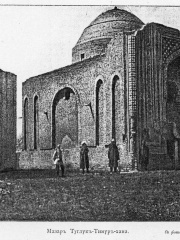
10. Tughlugh Timur (1329 - 1363)
With an HPI of 66.20, Tughlugh Timur is the 10th most famous Kazakhstani Politician. His biography has been translated into 23 different languages.
Tughlugh Timur Khan (Chagatai: توغلوق تیمور خان; Tughluk Timur; 1312/13–1363) was the Khan of Moghulistan from c. 1347 and Khan of the whole Chagatai Khanate from c. 1360 until his death, Esen Buqa (a direct descendant of Chagatai Khan) was his father who was also the former Khan of the Chagatai Khanate, His reign is known for his conversion to Islam and his invasions of Transoxiana.
People
Pantheon has 49 people classified as Kazakhstani politicians born between 600 BC and 1994. Of these 49, 29 (59.18%) of them are still alive today. The most famous living Kazakhstani politicians include Nursultan Nazarbayev, Kassym-Jomart Tokayev, and Alu Alkhanov. The most famous deceased Kazakhstani politicians include Tomyris, Seljuk, and Muhammad Shaybani. As of April 2024, 10 new Kazakhstani politicians have been added to Pantheon including Oljas Bektenov, Mihhail Kõlvart, and Roman Sklyar.
Living Kazakhstani Politicians
Go to all RankingsNursultan Nazarbayev
1940 - Present
HPI: 77.27
Kassym-Jomart Tokayev
1953 - Present
HPI: 72.91
Alu Alkhanov
1957 - Present
HPI: 62.06
Akhmed Zakayev
1959 - Present
HPI: 58.07
Dariga Nazarbayeva
1963 - Present
HPI: 57.86
Daniyal Akhmetov
1954 - Present
HPI: 55.87
Ruslan Aushev
1954 - Present
HPI: 55.63
Karim Massimov
1965 - Present
HPI: 54.98
Älihan Smaiylov
1972 - Present
HPI: 54.50
Imangali Tasmagambetov
1956 - Present
HPI: 54.27
Rashid Nurgaliyev
1956 - Present
HPI: 53.69
Askar Mamin
1965 - Present
HPI: 53.58
Deceased Kazakhstani Politicians
Go to all RankingsTomyris
600 BC - 600 BC
HPI: 81.59
Seljuk
902 - 1038
HPI: 73.38
Muhammad Shaybani
1451 - 1510
HPI: 72.01
Akhmad Kadyrov
1951 - 2004
HPI: 71.59
Vladimir Zhirinovsky
1946 - 2022
HPI: 70.91
Aslan Maskhadov
1951 - 2005
HPI: 70.62
Edigu
1352 - 1419
HPI: 67.25
Tughlugh Timur
1329 - 1363
HPI: 66.20
Ablai Khan
1711 - 1781
HPI: 65.95
Zelimkhan Yandarbiyev
1952 - 2004
HPI: 65.28
Dinmukhamed Kunaev
1912 - 1993
HPI: 62.99
Jambyl Jabayev
1846 - 1945
HPI: 61.83
Newly Added Kazakhstani Politicians (2025)
Go to all RankingsOljas Bektenov
1980 - Present
HPI: 50.60
Mihhail Kõlvart
1977 - Present
HPI: 45.91
Roman Sklyar
1971 - Present
HPI: 43.98
Mukhtar Tleuberdi
1968 - Present
HPI: 43.12
Anton Khudobin
1986 - Present
HPI: 37.38
Nurbakyt Tengizbayev
1983 - Present
HPI: 36.59
Serik Yeleuov
1980 - Present
HPI: 35.67
Gusman Kyrgyzbayev
1992 - Present
HPI: 34.90
Berik Abdrakhmanov
1986 - Present
HPI: 34.21
Aiman Umarova
HPI: 29.10
Overlapping Lives
Which Politicians were alive at the same time? This visualization shows the lifespans of the 13 most globally memorable Politicians since 1700.

